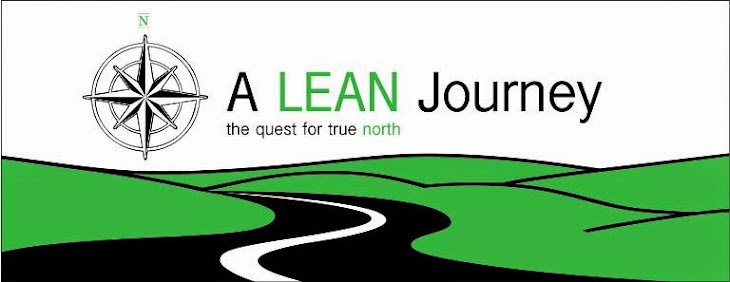On Fridays I will post a Lean related Quote. Throughout our lifetimes many people touch our lives and leave us with words of wisdom. These can both be a source of new learning and also a point to pause and reflect upon lessons we have learned. Within Lean active learning is an important aspect on this journey because without learning we can not improve.
“Nothing has the power to broaden the mind as the ability to investigate systematically and truly all that comes under thy observation in life.” — Marcus Aurelius
All too often, attempts
are made to solve problems without knowing anything about or are not being
familiar with a particular area or process — resulting in a misdiagnosis or
failed solution. Answers come from the floor, from the ‘gemba,’ where the
condition occurs. You need to go to the real place and experience these
conditions for yourself before being able to take the next steps.
are made to solve problems without knowing anything about or are not being
familiar with a particular area or process — resulting in a misdiagnosis or
failed solution. Answers come from the floor, from the ‘gemba,’ where the
condition occurs. You need to go to the real place and experience these
conditions for yourself before being able to take the next steps.
No matter what
your position is or what you are working on you can not underestimate the
importance of going to the Gemba. Gemba is the Japanese word for “actual
place.” You can’t solve problems at your desk. Going to the Gemba is a great
way to get the entire team involved in identifying and solving problems. It is
grounded in fact finding using actual conditions from the actual workers who perform
the work. This activity creates energy within the team solving the problem
leading to experimentation, ideas, and discussion on improvements.
your position is or what you are working on you can not underestimate the
importance of going to the Gemba. Gemba is the Japanese word for “actual
place.” You can’t solve problems at your desk. Going to the Gemba is a great
way to get the entire team involved in identifying and solving problems. It is
grounded in fact finding using actual conditions from the actual workers who perform
the work. This activity creates energy within the team solving the problem
leading to experimentation, ideas, and discussion on improvements.
Lean leaders
should go to the shop floor and get their hands dirty by working on process
improvement. People expect their leaders to be innovative. Allow others to see your creativity in action
on the front lines. Leaders need to do
more and observe less. Action is
observation in full motion.
should go to the shop floor and get their hands dirty by working on process
improvement. People expect their leaders to be innovative. Allow others to see your creativity in action
on the front lines. Leaders need to do
more and observe less. Action is
observation in full motion.
There is no
better way to experience the flow of value (or lack thereof) than taking the
same journey that an order, new product, patient or other takes through your
processes. Start where the order, product or person enters your value stream
and “go see” all the places they go from start to finish. Look for
all forms of the 7 wastes and when you see them, think about “why”
they exist. Do this often in order to gain a true understanding of your
processes. What happens on Monday is not necessarily what happens on Friday.
better way to experience the flow of value (or lack thereof) than taking the
same journey that an order, new product, patient or other takes through your
processes. Start where the order, product or person enters your value stream
and “go see” all the places they go from start to finish. Look for
all forms of the 7 wastes and when you see them, think about “why”
they exist. Do this often in order to gain a true understanding of your
processes. What happens on Monday is not necessarily what happens on Friday.
In data
collection, impartial observations of how the process is currently running are
critical in identifying waste with respect to time, materials, etc. You can
observe a lot by simply watching, although in some environments it may be
difficult to observe the work itself. This is because there are so many work
products that are virtual, for example, emails, phone, computer inputs and
reports. In these cases, process observation with trained observers can be
powerful.
collection, impartial observations of how the process is currently running are
critical in identifying waste with respect to time, materials, etc. You can
observe a lot by simply watching, although in some environments it may be
difficult to observe the work itself. This is because there are so many work
products that are virtual, for example, emails, phone, computer inputs and
reports. In these cases, process observation with trained observers can be
powerful.
Many managers
rely on gut instinct to make important decisions, which often leads to poor
results. On the contrary, when managers insist on incorporating facts and
evidence, gathered from direct observation at the source they make better
choices and their companies benefit. Lean companies however strive to empower
their employees to make decisions at all levels through access to data,
knowledge of evaluation methods, and defined standard processes.
rely on gut instinct to make important decisions, which often leads to poor
results. On the contrary, when managers insist on incorporating facts and
evidence, gathered from direct observation at the source they make better
choices and their companies benefit. Lean companies however strive to empower
their employees to make decisions at all levels through access to data,
knowledge of evaluation methods, and defined standard processes.
Supervisors and
managers must continually walk through the factory to see that standards are
being followed and to practice seeing waste. Operators need to continually
examine their own operations to stay alert for new problems and new ideas for
solving them that may come to mind as they do their jobs.
managers must continually walk through the factory to see that standards are
being followed and to practice seeing waste. Operators need to continually
examine their own operations to stay alert for new problems and new ideas for
solving them that may come to mind as they do their jobs.
There is no
substitute for observation when it comes to problem solving.
substitute for observation when it comes to problem solving.
 A Lean Journey
A Lean Journey 




Leave a Comment
Your email address will not be published. Required fields are marked with *